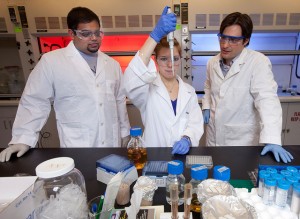Justin Hines, assistant professor of chemistry, and a team of students are conducting experiments that could lead to greater knowledge about diseases like Mad Cow, Alzheimer’s, and Parkinson’s.

Milan Patel ’12 (l-r), Elizabeth Troisi ’14, and Justin Hines work in Hugel Science Center.
Hines, who joined Lafayette in fall 2011 after being named an Education Mentor in Life Sciences by the National Academies, has teamed up with Milan Patel ’12, Nick Henderson ’12, Julia Harris ’13 (East Hartford, Conn.), and Elizabeth Troisi ’14 (Londonderry, N.H.) to conduct experiments on proteins in the baker’s yeast Saccharomyces cerevisiae. Their research could pave the way to more effective treatments of protein misfolding diseases.
Hines has been awarded a Cottrell College Science Award from the Research Corporation for Science Advancement. The $35,000 research grant will provide funds for four students to do summer research in his lab over the next few years.
The project focuses on the relationships between “prion” proteins and “chaperone” proteins. For proteins to perform their functions properly, they must fold into the correct shape. Prion proteins have folded incorrectly, or misfolded. Meanwhile, chaperone proteins prevent and combat the misfolding of other proteins.
When proteins misfold into a particular shape, they are called “amyloids.” These structures, when present in human and animal tissue, are associated with diseases like Mad Cow, Alzheimer’s, and Parkinson’s. By exploring how chaperone proteins recognize and deal with amyloids in yeast, Hines and his team hope to find better ways of combating them in people. Working with yeast, rather than human and animal tissue, also ensures that the team can study these amyloids safely.
”Students in the lab work with various chaperone protein genes and alter them, so that we can see what effect the altered protein will have on a specific prion,” says Hines. “From this work, we hope to understand what dictates the specificity of a particular chaperone for a particular prion.”
Troisi, a biology major, is enjoying her first taste of biochemical research, a field she now intends to pursue after graduation.
“I think biology is fascinating and I enjoy chemistry, so I like seeing the connection between the two of them,” she says. “I also really enjoy getting the results from our experiments and making connections with other experiments done by other people.”
Patel, who graduated in May with a B.S. in biochemistry, enjoyed having free rein to design his own experiments, a task that required both critical thinking and an appreciation of the unknown.
“It’s that sense of uncertainty in the results that I loved most,” he says. “It’s like you are trying to piece together different snippets of information to form this grand idea that no one else has come up with.”
Troisi and Patel agree that Hines’ passion for the project has been infectious.
“It is hard not to be excited about what I’m doing when I’m working with him,” says Troisi. “He challenges me to think and learn every time I am in the lab.”
“He did not just lecture us and expect us to retain that information,” says Patel. “Instead, he led us on until we figured out the material on our own. This style really gave me the sense that I am working with Professor Hines on the project, not for him, allowing me to be passionate about the work as well.”
Learn more about undergraduate research at Lafayette
